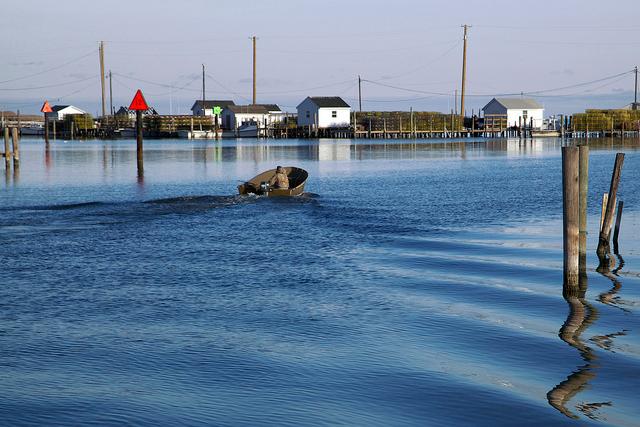An island in Chesapeake Bay is disappearing — and so is a British dialect and a piece of history
Tangier Island, in Chesapeake Bay
Tangier Island, a little known speck of land in Virginia’s Chesapeake Bay, is slowly disappearing under the water.
Residents argue over whether the sea is rising or the island is sinking, but one thing is inarguable: once-thriving areas of the island are now abandoned and uninhabitable.
As the waters around Tangier Island slowly swallow up the shoreline, more than the land is being threatened: a way of life, a fascinating history, and a unique local dialect are all in danger of vanishing for good.
Captain John Smith “discovered” Tangier in 1608, and the British claimed it. The first permanent settlers arrived in 1686. In 1812, the Royal Marines built Fort Albion, which is now completely underwater. They offered American slaves safe haven on the island and freed them. Many of the former slaves enlisted in the Royal Marines, and then relocated to British colonies in the Caribbean.
“A lot of residents on the island are really proud of that — that thousands of slaves took their first steps of freedom on Tangier Island,” says journalist Kate Kilpatrick.
Kilpatrick, a writer for Al Jazeera America, wrote a long piece about the island and recorded interviews with some of its residents. She had seen videos on YouTube and was fascinated by a dialect unlike anything she had heard before.
“Some people call it ‘Elizabethan’ or a ‘Restoration-era English accent,’ but it’s not really that,” Kilpatrick says. A book written by a local Tangier man, David Shores, says the dialect descends from early settlers who came from the Cornwall region of southwest England. Because the island is so isolated, much of that dialect has remained intact.
The younger generation now has satellite TV and iPads, so their speech is becoming more like standard English, Kilpatrick explains. “But when you get to talking to some the older folks, especially the older watermen, you really hear [the old dialect.]”
One of the quirks of the dialect is something called “backwards talk," illustrated here:
“If I wanted to tell you that you had missed the opportune time to do something, I would not say that,” one resident explains. “I would say, ‘Well, you’re too soon‘ — meaning you’re late.”
Another resident says: “If, just for instance, a boat goes by or something, we’ll say, ‘Boy, she don’t go. She don’t get out, she don’t go very fast.’ Stuff like that. But what we’re really saying is how fast she goes.”
“A lot of their backwards talk just seems like an extreme form of sarcasm,” Kilpatrick says, “but they have some other expressions, like ‘Got the mibs,’ [which] means you’re smelly or you stink. Or if you’re thirsty, you’ll say, ‘as dry as Peckard’s cow.’ Peckard apparently was a farmer that used to live on Tangier many years ago.”
At Tangier’s height, 1200 people lived on the island. By 2000, that number had shrunk by half; today the population is about 470.
The economy on the island is rough, especially for younger people, Kilpatrick says. “The breadwinners of the family are the watermen, and they spend their days oystering in winter and crabbing in summer,” she says. “But the population is shrinking. It's shrinking and it's aging.”
“For young people, there really aren't any sort of jobs or economic opportunities on the island,” Kilpatrick continues. “There isn’t a college on the island, so young people typically either head to the mainland to go to college or get jobs working on the tugboats.”
Gary Parks, an island resident and waterman talks about the prospects for the younger generation on Tangier:
“When we grew up, all we wanted to be was a waterman, but all our children are moving off to other careers ’cause there’s just no more future in the water business," says Parks, an island resident and waterman. "On the mainland, they can get jobs, you know — they're on the mainland, they can drive to their work. But here on Tangier, on the island, well, it’s all we’ve got, is the water. If you’re not a waterman, you can’t make it on Tangier.”
Kilpatrick says rising sea levels affect the land itself even more than its economy. The western side of the island is getting battered the worst; it’s losing 15 to 16 feet a year. An area called The Uppards, once the center of the town, is the most threatened. Around the 1920s, people started leaving that area, in part because of the encroaching water. Now The Uppards is uninhabited.
The islanders aren’t giving up. They are building a seawall to protect the harbor, where the mailboats and ferries come in. They hope to complete it by 2016.
But they say they are worried. A big storm could easily wipe them out before they get the seawall built.
This article is based on an interview and transcript from PRI's Living on Earth with Steve Curwood, a weekly environmental news and information show.
